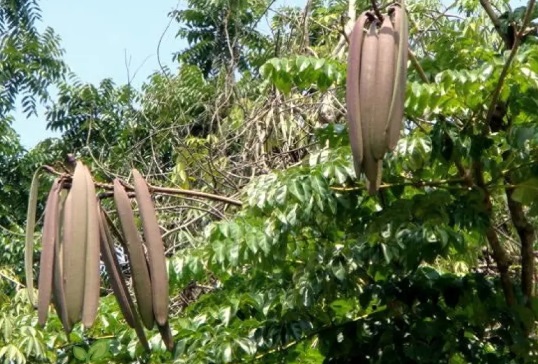Thailand Medical and Pharmaceutical Study Explores Oroxylum Indicum Root Extract to Treat Alzheimer’s Disease
Nikhil Prasad Fact checked by:Thailand Medical News Team Jan 15, 2025 2 months, 4 weeks, 2 days, 1 hour, 28 minutes ago
Thailand Medical: A New Natural Hope for Alzheimer’s Disease
Researchers from the Faculty of Pharmaceutical Sciences at Khon Kaen University and Ubon Ratchathani University in Thailand, have made significant strides in understanding how the Oroxylum indicum root can combat Alzheimer’s disease (AD). This
Thailand Medical News report delves into their findings, which highlight the root’s potential as a source of therapeutic agents for this neurodegenerative disorder.
 Thailand Medical and Pharmaceutical Study Explores Oroxylum Indicum Root Extract to
Thailand Medical and Pharmaceutical Study Explores Oroxylum Indicum Root Extract to
Treat Alzheimer’s Disease
Alzheimer’s disease is a debilitating condition marked by progressive cognitive decline, memory loss, and eventual loss of independence. Currently, there is no cure, and available treatments offer limited effectiveness. The challenge of finding effective therapies is compounded by the multifaceted nature of the disease, which involves oxidative stress, protein misfolding, cholinergic dysfunction, and neuronal death. This article explores how the researchers have identified natural compounds in Oroxylum indicum root that target these critical pathways.
Understanding the Potential of Oroxylum Indicum Root
Oroxylum indicum, a medicinal plant native to Southeast Asia, has a long history of traditional use for ailments ranging from respiratory issues to gastrointestinal disorders. Recent studies have focused on its roots, which contain flavonoids such as baicalein, chrysin, and oroxylin A. These bioactive compounds are known for their antioxidant, anti-inflammatory, and neuroprotective properties.
In their study, the researchers prepared an ethanol-based extract of Oroxylum indicum root and subjected it to rigorous analysis. High-performance liquid chromatography (HPLC) identified baicalein as the predominant compound, followed by oroxylin A and chrysin. The extract’s total phenolic and flavonoid content was found to be substantial, underscoring its therapeutic potential.
Key Findings of the Study
Antioxidant Properties
Oxidative stress is a hallmark of Alzheimer’s disease, contributing to neuronal damage and cognitive decline. Using the DPPH assay, the researchers demonstrated the strong antioxidant activity of the Oroxylum indicum root extract. Baicalein showed the highest radical scavenging ability, surpassing even the positive control, Trolox. This suggests that baicalein plays a central role in mitigating oxidative stress.
Inhibition of Acetylcholinesterase Activity
Cholinergic dysfunction, marked by reduced levels of acetylcholine, is a key feature of Alzheimer’s disease. The study revealed that the root extract and its constituents inhibit acetylcholinesterase (AChE), an enzyme responsible for breaking down acetylcholine. Chrysin was the most potent inhibitor, followed by oroxylin A and baicalein. Molecular docking studies further illustrated how these compounds interact with AChE, potenti
ally enhancing neurotransmission and cognitive function.
Anti-Amyloidogenic Effects
Amyloid plaques, formed by the aggregation of beta-amyloid peptides, are a defining characteristic of Alzheimer’s disease. The study found that the Oroxylum indicum root extract significantly inhibited beta-amyloid aggregation. Baicalein emerged as the most effective compound, binding to key regions of the beta-amyloid peptide and disrupting its aggregation. This finding positions baicalein as a promising agent for reducing plaque formation.
Neuroprotective Effects Against Oxidative Damage
Using neuroblastoma SH-SY5Y cells, the researchers evaluated the extract’s ability to protect neurons from hydrogen peroxide-induced oxidative damage. The results were compelling: the extract increased cell viability and reduced markers of apoptosis, such as Bax and cleaved caspase-3. These effects highlight the extract’s dual role in neutralizing reactive oxygen species and preventing programmed cell death.
Modulation of Alzheimer’s Disease Pathways
The study also examined the extract’s impact on proteins involved in Alzheimer’s disease pathology. Pretreatment with the extract and baicalein reduced the expression of BACE1, an enzyme critical for beta-amyloid production, and lowered levels of phosphorylated tau, a component of neurofibrillary tangles. By targeting these pathways, the extract addresses two major drivers of neuronal dysfunction in Alzheimer’s disease.
Implications and Future Directions
The findings suggest that Oroxylum indicum root extract, particularly baicalein, holds promise as a multi-target therapeutic for Alzheimer’s disease. Its ability to mitigate oxidative stress, inhibit acetylcholinesterase, prevent beta-amyloid aggregation, and protect neurons from apoptosis addresses key aspects of the disease. However, translating these findings into clinical applications requires further research.
Future studies should explore the extract’s efficacy and safety in animal models and eventually in human trials. Additionally, understanding the bioavailability and metabolism of baicalein and other active compounds will be crucial for developing effective formulations.
Conclusion
The research conducted by the institutions in Thailand and Indonesia underscores the potential of Oroxylum indicum root as a natural source of therapeutic agents for Alzheimer’s disease. Its multifaceted effects on key disease pathways make it a promising candidate for further investigation. As the global burden of Alzheimer’s disease continues to rise, harnessing the power of nature could pave the way for innovative treatments.
The study findings were published in the peer-reviewed journal: Plants.
https://www.mdpi.com/2223-7747/14/2/223
For the latest Medical Research News, keep on logging to
Thailand Medical News.
Read Also:
https://www.thailandmedical.news/news/thailand-medical-study-involving-ginger-phytochemicals-could-transform-neurodegenerative-disease-treatments
https://www.thailandmedical.news/news/thailand-medical-researchers-explore-the-use-of-kratom-to-treat-alzheimer-s-disease
https://www.thailandmedical.news/news/thailand-medical-study-reveals-benefits-of-black-sticky-rice-for-mental-health
https://www.thailandmedical.news/news/new-thailand-medical-study-reveals-link-between-oral-microbiota-and-alzheimer-s-disease
https://www.thailandmedical.news/news/thailand-medical-researchers-find-that-huperzine-a-from-huperzia-serrata-moss-can-help-combat-alzheimer-s-disease
https://www.thailandmedical.news/articles/thailand-medical
